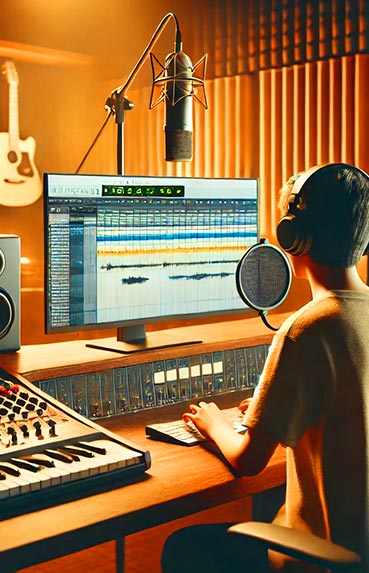Artificial intelligence (AI) is rapidly transforming the industrial landscape, especially in the realm of automation. From factories to logistics centers, AI is being integrated into a variety of industrial processes, promising significant improvements in efficiency, quality, and safety. This article explores how AI is reshaping industrial automation, providing concrete examples and practical tips for its implementation.
The Impact of AI on Industrial Automation
The Industry 4.0 Revolution
The fourth industrial revolution, also known as Industry 4.0, is characterized by the merging of advanced technologies that blur the lines between the physical and digital worlds. AI is a central component of this transformation, enabling smarter and more connected automation.
- System Integration: AI facilitates the integration of production and logistics systems, allowing seamless communication between machines, devices, and people.
- Real-Time Data Analysis: Thanks to AI, companies can analyze large volumes of data in real-time, enabling them to make more informed and quicker decisions.
- Production Personalization: AI's ability to process data at high speed allows for mass customization, tailoring products to the specific needs of customers without sacrificing efficiency.
Productivity Increase
One of the main advantages of AI in industrial automation is the increase in productivity. AI allows machines to operate more efficiently and accurately, reducing downtime and human errors.
- Predictive Maintenance: Using AI algorithms, companies can predict when a machine is likely to fail, allowing maintenance to be performed before a problem occurs. This reduces unplanned downtime and repair costs.
- Process Optimization: AI can analyze entire workflows to identify bottlenecks and areas for improvement, optimizing the overall system performance.
- Automation of Repetitive Tasks: Repetitive and monotonous tasks can be automated, freeing up workers to focus on more creative and value-added activities.
Concrete Applications of AI in Industry
Advanced Robotics
Robotics is an area where AI has had a significant impact. Industrial robots have evolved to be more intelligent, flexible, and collaborative.
- Collaborative Robots (Cobots): These robots are designed to work alongside humans, sharing the workspace and performing complex tasks safely. Cobots use AI to adapt and learn from their interactions with the environment and human workers.
- Computer Vision: AI powers computer vision systems that allow robots to "see" and understand their surroundings, enhancing their ability to perform complex tasks such as assembly or quality inspection.
Quality Control and Defect Detection
AI is increasingly used to improve quality control on production lines.
- Automated Inspection Systems: Equipped with high-resolution cameras and AI algorithms, these systems can detect defects in products at a speed and accuracy beyond human capabilities.
- Predictive Analysis: By analyzing historical production data, AI can predict defects before they occur, enabling companies to take preventive measures.
Implementing AI in quality control has been shown to reduce production defects by 30% in some industries, thereby improving customer satisfaction and reducing costs associated with defective products.
Challenges in Implementing AI in Automation
Complexity and Initial Costs
Implementing AI in industrial automation can be complex and costly. However, with proper planning, companies can mitigate these challenges.
- Needs Assessment: Before implementing AI, it is crucial to assess the specific needs of the company and determine where AI can add the most value.
- Infrastructure Investment: AI requires adequate infrastructure, including sensors, communication systems, and data processing platforms.
- Staff Training: Employees need to be trained to work with AI-based technologies, which may require time and resources.
Security and Ethics
The adoption of AI in the industry also raises security and ethical questions that need to be addressed.
- Cybersecurity: As more industrial systems connect to the internet, the risk of cyberattacks increases. Robust security measures are essential to protect data and systems.
- Impact on Employment: AI-driven automation can impact employment, displacing some workers. It is important to consider retraining and transition policies for affected employees.
Practical Tips for AI Implementation
Implementation Strategies
To maximize the benefits of AI in industrial automation, companies should follow some key strategies.
- Start with Pilot Projects: Before full-scale implementation, it is advisable to start with pilot projects to evaluate the impact of AI in a controlled environment.
- Collaboration with Experts: Partnering with technology companies and AI experts can provide valuable expertise and accelerate the implementation process.
- Adopt an Iterative Approach: AI implementation should be an iterative process, allowing for continuous adjustments and improvements based on the results obtained.
Success Stories
Numerous companies have successfully transformed their operations by implementing AI in industrial automation.
- Siemens: Has implemented AI-based predictive maintenance systems in its production plants, significantly reducing downtime and maintenance costs.
- General Electric: Uses AI to optimize its manufacturing processes, improving operational efficiency and product quality.
- Tesla: Employs AI in its production lines to automate the assembly of electric vehicles, enhancing precision and reducing production time.
The Future of AI in Industrial Automation
Emerging Innovations
AI will continue to evolve, bringing with it new innovations that will further transform industrial automation.
- Digital Twins: The creation of virtual models of physical processes using AI will allow companies to simulate and optimize operations before implementing them in the real world.
- Explainable AI: As AI systems become more complex, the need arises to develop explainable AI that allows humans to understand and trust the decisions made by artificial intelligence.
- Cognitive Automation: The combination of AI with other emerging technologies, such as the Internet of Things (IoT) and machine learning, will lead to cognitive automation systems that can adapt and learn autonomously.
Artificial intelligence is transforming industrial automation in ways previously unimaginable. As technology continues to advance, the opportunities to improve efficiency, quality, and safety in industrial operations are virtually limitless. Companies that adopt these technologies with a well-planned strategy and an awareness of the challenges will be better positioned to lead in the future of the industry.

















